外研版学高中StageandscreenPeriodWriting教学案必修第二册英语
- 格式:docx
- 大小:206.44 KB
- 文档页数:8
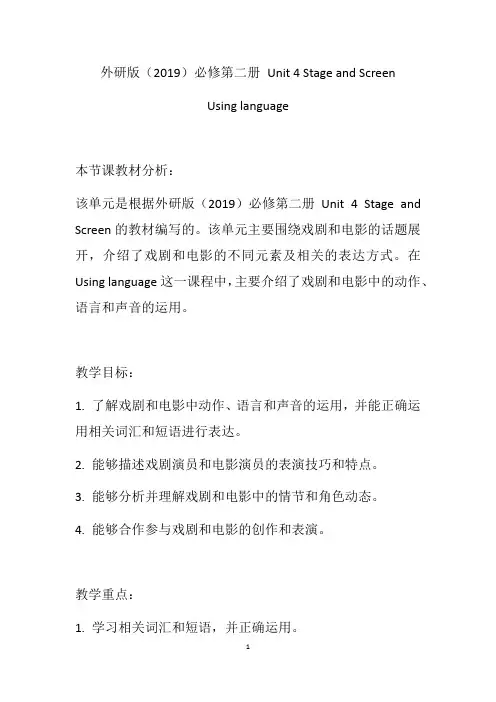
外研版(2019)必修第二册Unit 4 Stage and ScreenUsing language本节课教材分析:该单元是根据外研版(2019)必修第二册Unit 4 Stage and Screen的教材编写的。
该单元主要围绕戏剧和电影的话题展开,介绍了戏剧和电影的不同元素及相关的表达方式。
在Using language这一课程中,主要介绍了戏剧和电影中的动作、语言和声音的运用。
教学目标:1. 了解戏剧和电影中动作、语言和声音的运用,并能正确运用相关词汇和短语进行表达。
2. 能够描述戏剧演员和电影演员的表演技巧和特点。
3. 能够分析并理解戏剧和电影中的情节和角色动态。
4. 能够合作参与戏剧和电影的创作和表演。
教学重点:1. 学习相关词汇和短语,并正确运用。
2. 分析和理解戏剧和电影中的情节和角色动态。
教学难点:1. 掌握戏剧和电影中动作、语言和声音的表达方式。
2. 能够分析和理解戏剧和电影中的情节和角色动态。
学情分析:学生处于高一阶段,英语基础较好,但对于戏剧和电影的相关知识可能了解不多。
学生对于新颖的教学内容有一定的好奇心和探索欲望,愿意参与各种活动和表演。
学生的合作意识较强,能积极在小组中分工合作。
教学策略:1. 引导学生通过互动、讨论、小组合作等方式主动参与学习,激发学生的学习兴趣。
2. 创设真实情境,让学生通过身临其境的体验感受戏剧和电影中的表演技巧和情节发展。
3. 鼓励学生自主学习和探究,通过小组合作完成创作和表演任务。
教学方法:1. 任务型教学法:设计多个任务,引导学生主动探究和运用所学知识。
2. 情景教学法:通过模拟戏剧和电影的情景,让学生身临其境地学习。
3. 合作学习法:组织小组活动,培养学生的合作能力和创新能力。
教学过程:导入环节(约5分钟):1. 引入主题:我们今天要学习的课题是关于舞台和电影的。
请同学们想一想,在舞台和电影中,我们常常可以看到一些特别的表达方式和技巧。
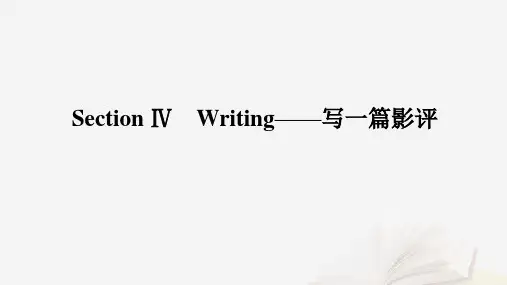
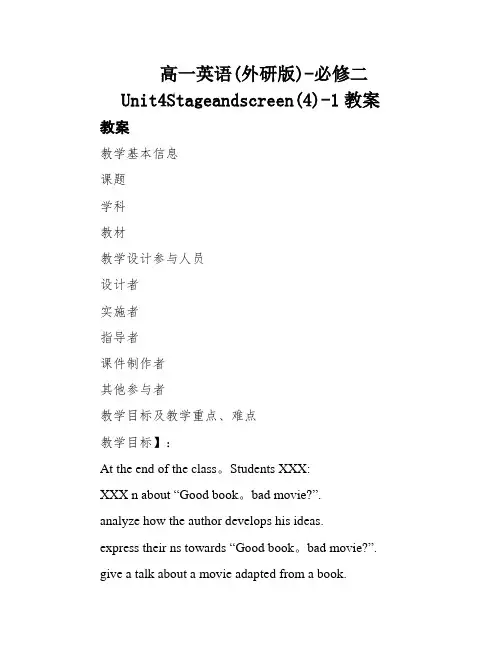
高一英语(外研版)-必修二Unit4Stageandscreen(4)-1教案教案教学基本信息课题学科教材教学设计参与人员设计者实施者指导者课件制作者其他参与者教学目标及教学重点、难点教学目标】:At the end of the class。
Students XXX:XXX n about “Good book。
bad movie?”.analyze how the author develops his ideas. express their ns towards “Good book。
bad movie?”. give a talk about a movie adapted from a book.重难点】重点:XXX n about “Good book。
bad movie?”To analyze how the author develops his ideas.难点:To express their ns towards “Good book。
bad movie?”To give a talk about a movie adapted from a book.教学过程(表格描述)讲授环节首要讲授举动设置企图姓名单位联系方式英语必修二Unit4 Stage and screen-Developing ideas (4)学段:高中年级一年级书名:《通俗高中教科书英语﹒2》出书社:XXX出书日期:2019年6月Step1Warm upXXXwhether they have read the books.XXXwhether they like the book or the movie.XXXthrough reading the title “Good Book。
Bad Movie?”XXX and checktheir ns.XXXsummarize the structure by reading the following paragraphs.XXX leads students to summarize the arguments and analyze how the author develops his ideas paragraph by paragraph.XXX asks students to read the n part andXXX.XXX students to read the last paragraphagain and summarize the author’s real meaning beyond XXX.XXXstudents haveknown and arousetheir interest.Step 2XXXXXX students’XXXXXXhave an overview ofthe text.To help studentsXXXthinking.Step 3Fast-readingStep 4Careful-readingStep 5Deep-readingXXX and analyzethe title again.XXX inspires students to express their ns towards “Good Book。
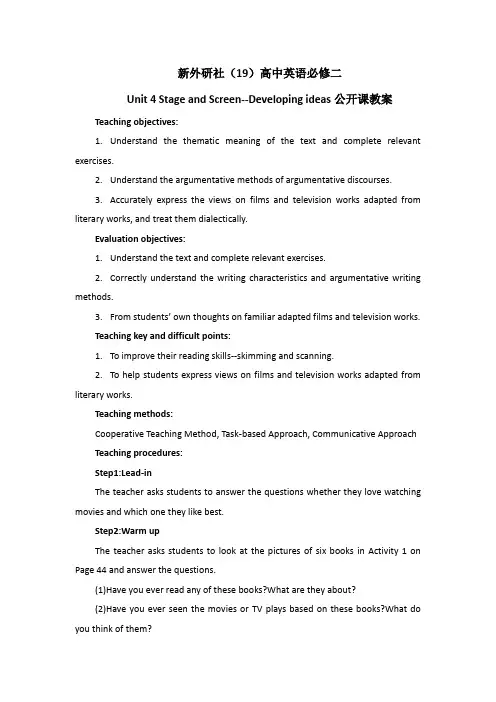
新外研社(19)高中英语必修二Unit 4 Stage and Screen--Developing ideas公开课教案Teaching objectives:1.Understand the thematic meaning of the text and complete relevant exercises.2.Understand the argumentative methods of argumentative discourses.3.Accurately express the views on films and television works adapted from literary works, and treat them dialectically.Evaluation objectives:1.Understand the text and complete relevant exercises.2.Correctly understand the writing characteristics and argumentative writing methods.3.From students’ own thoughts on familiar adapted films and television works.Teaching key and difficult points:1.To improve their reading skills--skimming and scanning.2.To help students express views on films and television works adapted from literary works.Teaching methods:Cooperative Teaching Method, Task-based Approach, Communicative Approach Teaching procedures:Step1:Lead-inThe teacher asks students to answer the questions whether they love watching movies and which one they like best.Step2:Warm upThe teacher asks students to look at the pictures of six books in Activity 1 on Page 44 and answer the questions.(1)Have you ever read any of these books?What are they about?(2)Have you ever seen the movies or TV plays based on these books?What do you think of them?Activity 2Skim the passage to fill in the blanks so as to get a general understanding of the whole passage.Main ideaPart 1 Problems Para.1The author puts forward a phenomenon that great words often 1.being turned into cinematic“turkeys”.Para.2Do good movies need good stories?Part 2 2.Para.3One of the reasons is that 3.and characters can be lost.Para.4Another reason is that things we expected may disappear in the movies.Part 3 Conclusion Para.5Come to a conclusion that we should judge a movie 4..Suggested answers:1.end up;2.Reasons;3.plot details;4.in its own rightActivity 31.Match the author’s opinions about the movie adaptations to the examples from the passage.(1)Some parts of the story and some characters are missing in the movie.(2)The visual images are not as striking as the descriptions in the book.(3)The movie is not as great as the book.(4)The movie doesn’t look the way we visualised while reading the book.(5)The characters do not stand out.(1)—a,(2)—d,(3)—c,(4)—e,(5)—b2.The teacher asks students to read“Learning to learn”on Page 45 to understand the functions of examples in argumentative essay.3.Read the passage carefully on Pages44-45 and choose the best answer.(1)What does the author want to talk about in this article?A.We shouldn’t judge a movie by the rules of its book version.B.Books are better than their movie versions.C.Movies have more impressed characters than books.D.Movies always make us disappointed.(2)What does the word “turkeys” mean in Paragraph 1?A.Success.B.Failures.C.Screen.D.Chicken.(3)What’s the function of Paragraph 2?A.To raise the readers’ cultural awareness.B.To prove good movies need good stories.C.To further confirm that good books always end up being turned into bad movies.D.To show that movies need impressive images.(4)From Paragraph 3,we can know that .A.reading a book is a waste of timeB.producing a film results in something important lost compared with the book versionC.a film only needs less than two hoursD.Harry Potter is a great success(5)Why do movies always disappoint us?A.Because they didn’t choose a good theme.B.Because they are often different from those in the books.C.Because they are badly performed.D.Because different audience have different views.(1)—(5) ABCBDLanguage points:1.They say that “a picture is worth a thousand words”,but the briefest look at books and the movies based on them would have anyone questioning this common saying.[句子翻译]__________________________________________________________★这是一个并列复合句。
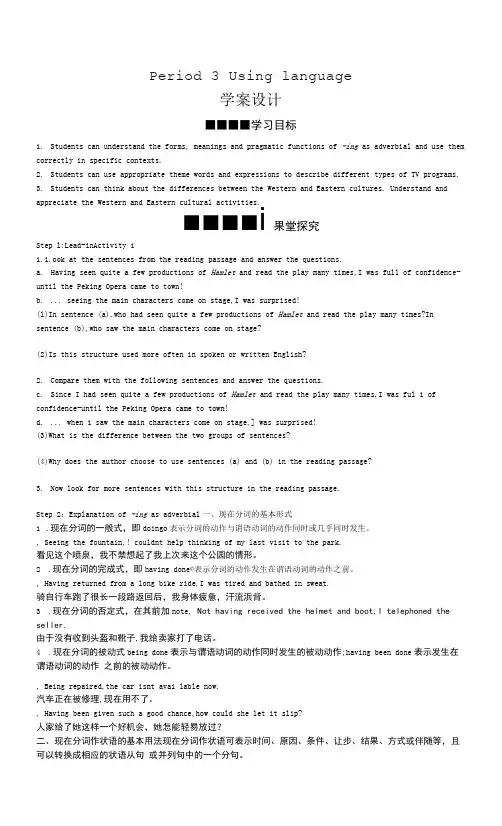
Period 3 Using language学案设计■■■■学习目标1.Students can understand the forms, meanings and pragmatic functions of -ing as adverbial and use them correctly in specific contexts.2.Students can use appropriate theme words and expressions to describe different types of TV programs.3.Students can think about the differences between the Western and Eastern cultures. Understand and appreciate the Western and Eastern cultural activities.■■■■i果堂探究Step l:Lead-inActivity 11.1.ook at the sentences from the reading passage and answer the questions.a.Having seen quite a few productions of Hamlet and read the play many times,I was full of confidence-until the Peking Opera came to town!b.... seeing the main characters come on stage,I was surprised!(l)In sentence (a),who had seen quite a few productions of Hamlet and read the play many times?In sentence (b),who saw the main characters come on stage?(2)Is this structure used more often in spoken or written English?pare them with the following sentences and answer the questions.c.Since I had seen quite a few productions of Hamlet and read the play many times,I was ful 1 of confidence-until the Peking Opera came to town!d.... when 1 saw the main characters come on stage,] was surprised!(3)What is the difference between the two groups of sentences?(4)Why does the author choose to use sentences (a) and (b) in the reading passage?3.Now look for more sentences with this structure in the reading passage.Step 2:Explanation of -ing as adverbial一、现在分词的基本形式1.现在分词的一般式,即doingo表示分词的动作与谓语动词的动作同时或几乎同时发生。
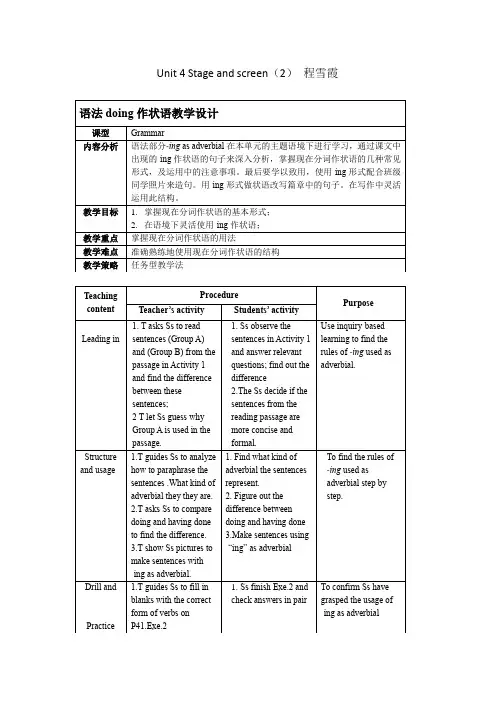
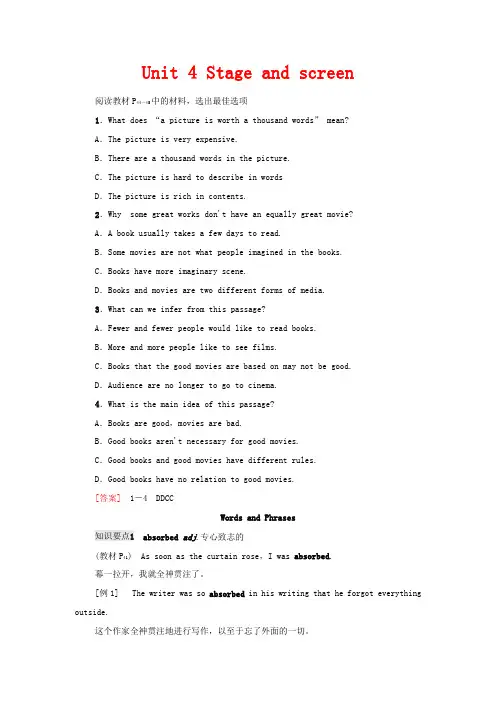
Unit 4 Stage and screen阅读教材P44-45中的材料,选出最佳选项1.What does “a picture is worth a thousand words” mean?A.The picture is very expensive.B.There are a thousand words in the picture.C.The picture is hard to describe in wordsD.The picture is rich in contents.2.Why some great works don't have an equally great movie?A.A book usually takes a few days to read.B.Some movies are not what people imagined in the books.C.Books have more imaginary scene.D.Books and movies are two different forms of media.3.What can we infer from this passage?A.Fewer and fewer people would like to read books.B.More and more people like to see films.C.Books that the good movies are based on may not be good.D.Audience are no longer to go to cinema.4.What is the main idea of this passage?A.Books are good,movies are bad.B.Good books aren't necessary for good movies.C.Good books and good movies have different rules.D.Good books have no relation to good movies.[答案]1-4 DDCCWords and Phrases知识要点1absorbed adj.专心致志的(教材P41) As soon as the curtain rose,I was absorbed.幕一拉开,我就全神贯注了。
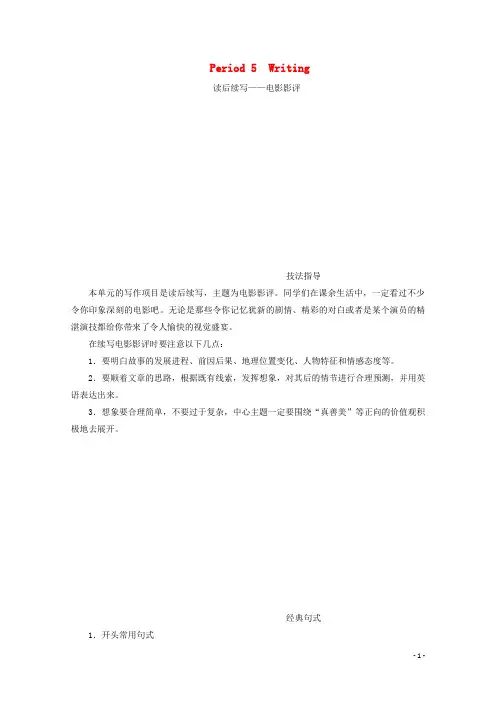
Period 5 Writing读后续写——电影影评技法指导本单元的写作项目是读后续写,主题为电影影评。
同学们在课余生活中,一定看过不少令你印象深刻的电影吧。
无论是那些令你记忆犹新的剧情、精彩的对白或者是某个演员的精湛演技都给你带来了令人愉快的视觉盛宴。
在续写电影影评时要注意以下几点:1.要明白故事的发展进程、前因后果、地理位置变化、人物特征和情感态度等。
2.要顺着文章的思路,根据既有线索,发挥想象,对其后的情节进行合理预测,并用英语表达出来。
3.想象要合理简单,不要过于复杂,中心主题一定要围绕“真善美”等正向的价值观积极地去展开。
经典句式1.开头常用句式Have you seen the latest Tarantino movie?你看过塔伦蒂诺最新的电影吗?The action takes place in France.这个故事发生在法国。
I like films with plenty of action.我喜欢情节曲折离奇的影片。
She has starred with many leading actors.她曾与许多大牌演员一起担任主角。
2.主体段落常用句式Julia Roberts is a famous Hollywood star.茱莉娅·罗伯茨是著名的好莱坞明星。
The hotel is popular with movie stars.这家酒店很受电影明星的喜爱。
Other members of the cast include Johnny Depp and Danny DeVito.剧组的其他成员包括约翰尼·德普和丹尼·德维托。
The play will be performed by an allfemale company.该剧将由一个女子剧团表演。
3.结尾常用句式The final episode will be shown next Sunday.最后一集将于下周日播放。
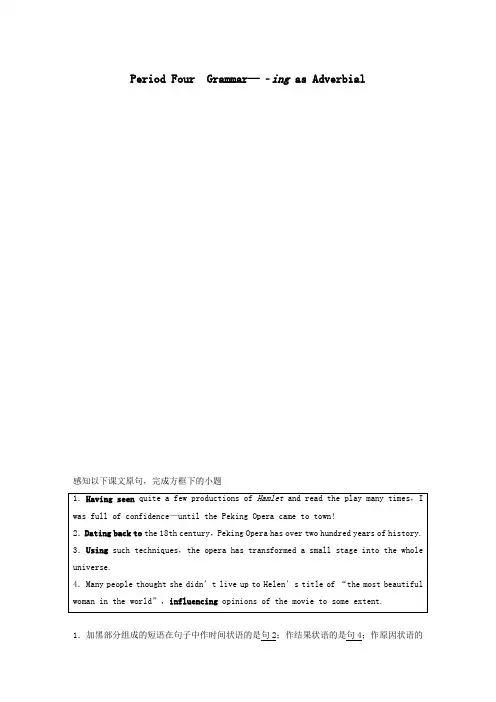
Period Four Grammar—ing as Adverbial感知以下课文原句,完成方框下的小题1.加黑部分组成的短语在句子中作时间状语的是句2;作结果状语的是句4;作原因状语的是句1;作方式状语的是句3。
2.句1中v.ing形式为完成式,表示动作发生在谓语动词表示的动作之前。
3.观察句1~4可知现在分词的逻辑主语都是句子的主语。
一、动词的ing形式作状语可以表示时间、原因、条件、结果、让步、方式或伴随情况等。
1.时间状语动词的ing形式作时间状语,相当于一个时间状语从句,所表示的动作与主句的动作一般是同时发生,有时可由连词when,while,after引出。
(1)Hearing the result(=When I heard the result),I couldn’t help jumping.听到这个结果,我不禁跳了起来。
(2)Having made full preparations(=After we have made full preparations),we are ready for the examination.做了充分的准备之后,我们准备参加考试。
2.原因状语可以与as/since/because等引导的原因状语从句转换。
(1)Being so excited(=As he was so excited),he couldn’t go to sleep that night.由于非常激动,那晚他没睡着。
(2)Having lived in the city for many years(=Since I had lived in the city for many years),I knew it well.因为在这个城市住了多年,所以我对它很了解。
3.条件状语可以与if/unless等引导的条件状语从句转换。
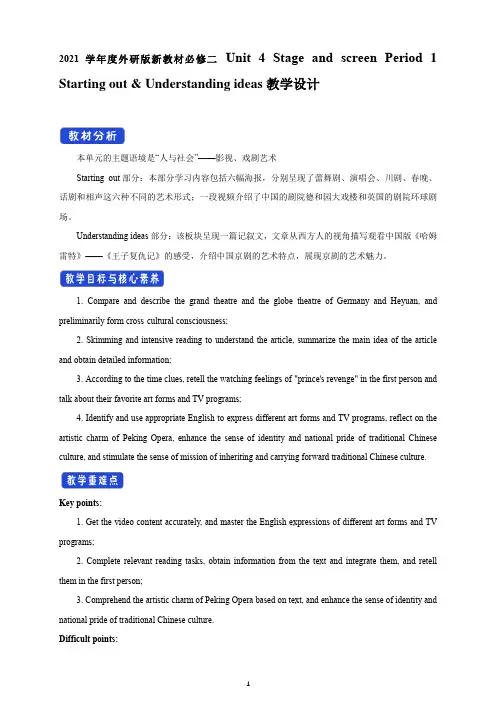
2021学年度外研版新教材必修二Unit 4 Stage and screen Period 1 Starting out & Understanding ideas教学设计本单元的主题语境是“人与社会”——影视、戏剧艺术Starting out部分:本部分学习内容包括六幅海报,分别呈现了蕾舞剧、演唱会、川剧、春晚、话剧和相声这六种不同的艺术形式;一段视频介绍了中国的剧院德和园大戏楼和英国的剧院环球剧场。
Understanding ideas部分:该板块呈现一篇记叙文,文章从西方人的视角描写观看中国版《哈姆雷特》——《王子复仇记》的感受,介绍中国京剧的艺术特点,展现京剧的艺术魅力。
1. Compare and describe the grand theatre and the globe theatre of Germany and Heyuan, and preliminarily form cross-cultural consciousness;2. Skimming and intensive reading to understand the article, summarize the main idea of the article and obtain detailed information;3. According to the time clues, retell the watching feelings of "prince's revenge" in the first person and talk about their favorite art forms and TV programs;4. Identify and use appropriate English to express different art forms and TV programs, reflect on the artistic charm of Peking Opera, enhance the sense of identity and national pride of traditional Chinese culture, and stimulate the sense of mission of inheriting and carrying forward traditional Chinese culture.Key points:1. Get the video content accurately, and master the English expressions of different art forms and TV programs;2. Complete relevant reading tasks, obtain information from the text and integrate them, and retell them in the first person;3. Comprehend the artistic charm of Peking Opera based on text, and enhance the sense of identity and national pride of traditional Chinese culture.Difficult points:1. Describe your favorite art forms and compare the similarities and differences between Chinese and foreign theaters;2. Retell the text according to the time clues and reflect on the artistic charm of Peking Opera.1. Let the students preview the contents of this section according to the guide plan, find out the new vocabulary, and understand the new vocabulary according to the context or consult the dictionary.2.Watch the movies Hamlet and the prince's revenge;3.Read the text on pages 38 - 39.Step 1 RevisionGo over the new words we learned in last class(on page 116).Step 2 Lead-inActivity 11.T presents 6 posters which represent 6 different types of entertainment and asks Ss to answer 3 questions:(1)Which of these types of entertainment are you most familiar with?(2)What other types of entertainment have you seen?(3)Which do you like most? Why?2.Ss look at 6 posters which represent 6 different types of entertainment and answer 3 questions.Step 3 Watching and thinkingActivity 21.T asks Ss to watch a video and answer 3 questions.(1) What theatres are mentioned in the video?(2)What are the differences between them?In what ways are they similar?2.Ss watch the video and discuss in pairs to answer 3 questions.Keys:(1)The Deheyuan Grand Theatre and the Globe Theatre.(2)Differences: The Deheyuan Grand Theatre is a Chinese-style theatre built in the Qing dynasty for the royal family, with Peking Opera as the main performance form. The theatre has three stages representing happiness, prosperity and longevity. Under the longevity stage, there is a well and five ponds.The first Globe Theatre was built in London by a group of actors including William Shakespeare. It burnt down in 1613 and was rebuilt close to the site of the original building. The theatre has a round shape and the stage area has three main elements.Similarities: Both of the theatres have a long history. They are both specially designed for better stage effects.Step 3 Pre-readingActivity 31. T asks Ss to look at the pictures of two performances and talk about their differences and similarities, thinking about the following questions:(1)What are the names of the plays?(2)Besides language, what are other different aspects between them?Before Ss answer questions,T plays a video of Peking Opera.2.Ss discuss in groups and share their answers with class.3.T introduces Peking Opera and guide Ss to pay attention to differences between Western drama and Peking Opera.Step 4 Fast readingActivity 41.T asks Ss to read the passage quickly and find out what aspects of Peking Opera most impressed the author by guiding the skills of reading.2.T can guide Ss to read the last paragraph and see if they can find out the answer.3.T asks Ss to choose the author’s purpose in writing the passage.(1)To prove that Peking Opera is a better way to perform Hamlet.(2) To inform the readers how to perform Hamlet through Peking Opera.(3) To share the unique experience of seeing a Peking Opera version of Hamlet.(4) To make a comparison between Eastern and Western cultures.Step 5 Careful-readingActivity 5 (Cooperation)1. T asks Ss to complete the chart in Activity 4.2. T asks Ss to retell the viewing experience in the first person with the help of the chart.3.Check the answers with class.Activity 6 (details understanding)1. T asks the Ss to read the passage carefully and complete the table.2. (If there is enough time.)Read the text carefully and choose the best answer according to the text.1.Why did the author go to see The Revenge of Prince Zidan?A.To confirm that Peking Opera is easier to understand.B.To make sure it has a long history.C.To enjoy the Peking Opera version of Hamlet.D.To find out the differences between Hamlet and its Peking Opera version.2.What began to change the author’s view on Peking Opera?A.The main characters.B.The exaggerated movements.C.Jinghu.D.The stage.3.What can we learn from Paragraph 4?A.The characters were performers as well as athletes.B.Prince Hamlet did a backflip before.C.The author didn’t like the play.D.The Revenge of Prince Zidan is a success.4.What does “I was on the edge of my seat” mean in Paragraph 5?A.He wanted to leave.B.He loved the performance.C.He was sick of the performance.D.He felt uncomfortable.Answers:1-4.ACDBStep 6 ComprehendingActivity 7 (Think & Share)T asks Ss to discuss the two questions in groups.1. Why does the author say “The Revenge of Prince Zidan ticks all the right boxes”?Because this show combines music, singing, drama, poetry and costume design with explosive effect. In the author's opinion, this show is perfect and meets all his requirements.2. How could you help a friend from overseas understand Peking Opera?①orchestra; ②performers’ movements; ③stage set; ④costumes and masksStep 7 Homework1.T asks students to read the text again and understand the passage better.plete the Exx in learning plan.3.Write down the difficult sentences.1、通过语篇学习,学生能否理解文章内容,是否了解了文章的主旨大意;2、通过本节内容学习和观看视频,学生是否体会到了京剧的艺术魅力;3、通过本节内容学习,学生掌握了阅读的方法——find out the main idea.。
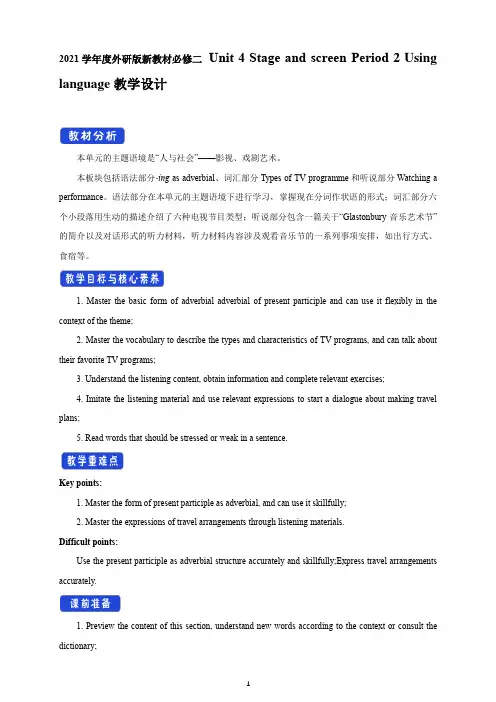
2021学年度外研版新教材必修二Unit 4 Stage and screen Period 2 Using language教学设计本单元的主题语境是“人与社会”——影视、戏剧艺术。
本板块包括语法部分-ing as adverbial、词汇部分Types of TV programme和听说部分Watching a performance。
语法部分在本单元的主题语境下进行学习,掌握现在分词作状语的形式;词汇部分六个小段落用生动的描述介绍了六种电视节目类型;听说部分包含一篇关于“Glastonbury音乐艺术节”的简介以及对话形式的听力材料,听力材料内容涉及观看音乐节的一系列事项安排,如出行方式、食宿等。
1. Master the basic form of adverbial adverbial of present participle and can use it flexibly in the context of the theme;2. Master the vocabulary to describe the types and characteristics of TV programs, and can talk about their favorite TV programs;3. Understand the listening content, obtain information and complete relevant exercises;4. Imitate the listening material and use relevant expressions to start a dialogue about making travel plans;5. Read words that should be stressed or weak in a sentence.Key points:1. Master the form of present participle as adverbial, and can use it skillfully;2. Master the expressions of travel arrangements through listening materials.Difficult points:Use the present participle as adverbial structure accurately and skillfully;Express travel arrangements accurately.1. Preview the content of this section, understand new words according to the context or consult the dictionary;2.Read the paragraphs that describe six TV programs and underline the words that describe the programs.Step 1 RevisionRead the text on page 38-39 quickly and underline the sentences with v-ing.1.Having seen quite a few productions of Hamlet and read the play many times, I was full of confidence - until the Peking Opera came to town!2.Dating back to the 18th century, Peking Opera has over two hundred years of history.3.Starting with an orchestra playing traditional Chinese instruments, the opera brought a completely new sound to my Western ears.ing such techniques, the opera had transformed a small stage into the whole universe.5.Feeling the strong emotions of love, anger, fear and grief in the performance, I could easily recognise the theme of Hamlet.T asks Ss to understand these sentences better, think of the function of v-ing in each sentence.Step 2 Learning new grammarActivity 11.1. T asks Ss to read sentences (a) and (b) in Activity 1 and answer questions 1 and2.Answers:①I.②I.2. T asks Ss to read sentences (c) and (d) in Activity 1 and answer questions 3 and 4.③What is the difference between the two groups of sentences?④Why does the author choose to use sentences (a) and (b) in the reading passage?Answers:③The first group uses present participles as adverbial while the second group uses adverbial clauses.④The sentences from the reading passage are more concise and formal.3.T asks Ss to read the other sentences in revision part and think of their functions.Activity 21.T asks Ss to complete the journal entry in Activity2.2.Ss complete the journal entry with the correct form of the verbs in brackets.3.Check their answers with class.Answers: 1.Seeing2.felt 3.making 4.to practise 5.Feeling 6.knowingStep 3 PracticeActivity 31. T asks Ss to rewrite the paragraph using the -ing form in Activity 3.2. Ss rewrite the paragraph using the-ing form in Activity3.3. Check the answers with class.Answers:I went to watch the ballet The Peony Pavilion last night. Having thought ballet was more or less the same everywhere, I was totally unprepared for its unique beauty. As soon as the curtain rose, I was absorbed. Borrowing a lot from Chinese dance and music, the Eastern influence on the ballet was clear. The production was full of colours and romantic symbols, challenging my senses in new ways. Enjoying it so much, I have changed my opinion about ballet. I can't wait to go again!Step 4 Reading and answeringActivity 41. T asks Ss to look at the pictures and answer the questions.①What do you know about these types of TV programme?②Can you think of some examples of each type?2. Ss talk about what they know about these types of TV programme.Activity 51. T asks Ss to read the descriptions in Activity 5, match them to the types of TV programme in Activity 4, and underline the words and expressions describing them.2. Check the answers with class.(1-c, 2-e, 3-d, 4-a, 5-b, 6-f)Step 5 PracticeActivity 61.T asks Ss to talk about their favourite TV programme using the words and expressions they have learnt.2.T asks Ss to read the short passage in “Did You Know?” to get some basic information about Glastonbury Festival.Step 6 ListeningActivity 71. T plays the recording for the first time and asks Ss to finish Activity 7.2. Ss listen for the first time to get some key information about the arrangements.Activity 81. 1. T plays the recording again for Ss to complete the flyer in Activity 8.2. T asks Ss to talk about how Josh makes arrangements by referring to the memo and the flyer.3. T asks Ss to summarise basic elements involved when making arrangements.Step 7 SpeakingActivity 91. T asks Ss to listen to the interview and choose the points mentioned.2. T asks Ss to listen again and complete the journalist’s notes.3. T asks Ss to listen for the third time and talks about the explanations Leah gives for doing Tai Chi.4. Listen again and then check answers with class.Step 8 Homework1)T asks Ss to make similar arrangements to attend a concert in another city.2)Remember the functions of v-ing.3)Complete the exercises in learning plan.1.通过本节内容学习,学生能否掌握现在分词的功能和用法;2.通过本节内容学习,学生能否掌握描述电视节目类型以及特点的词汇,能否谈论自己喜爱的电视节目。
Lesson Plan: Unit 4 Stage and ScreenAim:By the end of the lesson, students will be able to:Understand and discuss different types of performing arts, including theater and film.Analyze and critique a performance or film.Use new vocabulary related to performing arts in context.Practice giving opinions and arguments in English.Materials:Clips or trailers of a play and a filmWhiteboard and markersTimerProjector or audio system (optional)Procedure:Warm-upAsk students to brainstorm and discuss in pairs or small groups: What are some different types of performing arts? Have they ever attended a play or a film screening? What did they enjoy about the experience?After a few minutes, ask each group to share their ideas with the class.TheaterShow a clip of a play or musical to the class.In pairs or small groups, have students discuss the performance, using new vocabulary related to theater in context.Ask each group to share one opinion or critique of the performance.FilmShow a trailer or clip of a film to the class.In pairs or small groups, have students discuss the film, using new vocabulary related to film in context.After 10-15 minutes, ask each group to share one opinion or critique of the film.VocabularyReview the new vocabulary related to performing arts as a class.Ask students to write a short paragraph using at least three new vocabulary words to describe a performance or film they have seen.Collect the paragraphs and provide feedback at a later time.WritingAsk students to write a short paragraph reflecting on their own experience with theater and film. What do they enjoy about these art forms? What are some of their favorite performances or films?Collect the paragraphs and provide feedback at a later time.Wrap-upReview the main ideas and vocabulary from the lesson.Ask students to share one opinion or critique they had of the performance or film.Assessment:Participation in class discussion and group workClarity and accuracy of the critiqueUse of new vocabulary in context in writing tasksExercise:What is a drama?a. A type of movieb. A type of playc. A type of bookWhat is a tragedy?a. A type of comedyb. A type of play that ends unhappilyc. A type of musicalWhat is a monologue?a. A type of dialogueb. A long speech given by one character in a playc. A type of songWhat is the difference between a movie and a play?a. A play is performed live on stage while a movie is recorded on film or video.b. A movie is performed live on stage while a play is recorded on film or video.c. There is no difference.What is a screenplay?a. The script for a playb. The script for a moviec. The script for a TV showAnswers:A type of playA type of play that ends unhappilyA long speech given by one character in a playA play is performed live on stage while a movie is recorded on film or video.The script for a movieHomework:Watch a movie or play and write a short analysis of the characters and their motivations.。
2021学年度外研版新教材必修二Unit 4 Stage and screen Period 3 Developing ideas教学设计本单元的主题语境是“人与社会”——影视、戏剧艺术。
本板块呈现了一篇议论文,利用举例论证的方法论证了一部好的文学作品有可能最终沦为荧幕上的败笔之作,并阐述了导致这一结果的原因。
读写部分的学习内容是一张《公主日记》的电影海报以及电影《公主日记》的一篇影评文章。
电影海报里涵盖了电影的基本信息,如电影名称、演员、导演、电影类型,等等。
影评涉及电影的简介和评论,包括主要人物、情节以及观影感受等。
1. Understand the thematic meaning of the text and complete relevant exercises;2. Understand the argumentative methods of argumentative discourse;3. Accurately express the views on film and television works adapted from literary works, and treat them dialectically;4. Master relevant vocabulary to introduce the basic information of the film;5. Understand the main writing purpose and discourse structure of film criticism, and complete the writing of film criticism according to the writing characteristics of film criticism.Key points:1. Understand the text and complete relevant exercises;2. Correctly understand the writing characteristics and argumentative writing methods;3. Form my own thoughts on familiar adapted film and television works;4. Sorted out the textual structure of film criticism, grasped the writing characteristics of film criticism,and completed the writing of film criticism.Difficult points:1. Express views on films and television works adapted from literary works;2. Write reviews.1.Read Good Book,Bad Movie?Know the point: a good piece of literature can end up on the screen.2.Read the poster for the princess diaries ahead of time, as well as a review article for the princessdiaries, for the basic information covered in the poster, such as movie title, actor, director, genre, etc.3. Understand new words in context or consult a dictionary to find out the difficulties.Step 1 Warming upActivity 11.T asks Ss to look at the pictures of 6 books and answer the questions.①Have you ever read any of these books? What are they about?②Have you ever seen the movies or TV plays based on these books? What do you think of them?2.Ss look at the pictures in Activity 1 and answer the questions.3.T introduces some of the six books or films.①Dream of the Red ChamberDream of the Red Chamber, also called The Story of the Stone, written by Cao Xueqin, is one of China's Four Great Classical Novels. It was written during the Qing Dynasty. The novel is generally considered to be the greatest of all Chinese novels and among the greatest in world literature.②The Great GatsbyThe Great Gatsby is a novel by the American author F. Scott Fitzgerald. First published in 1925, it is set on Long Island's North Shore and in New York City from spring to autumn of 1922, which is ranked second in the Modern Library's lists of the 100 Best Novels of the 20th Century.③Sherlock HolmesSherlock Holmes is a fictional consulting detective in London created by Scottish author andphysician Sir Arthur Conan Doyle. Holmes is known for his proficiency with observation, forensic science, and logical reasoning. Together with his assistant, Dr John H. Watson, he pursues criminals throughout London, the south of England, and continental Europe.④Rickshaw BoyWritten by Lao She, Rickshaw Boy is considered by many to be one of the masterpieces of modern Chinese literature. It describes the difficult life of a rickshaw puller during the years of warlord turmoil. This book is famous for its vivid descriptions of life in the city of Beijing at the beginning of the 20th century.⑤Moment in PekingMoment in Peking is a novel originally written in English by Chinese author Lin Yutang. The novelcovers the turbulent events in China from 1900 to 1938, and it focuses on the lives of several different families and people, along with their interactions during that time.⑥The IliadThe Iliad is said to be an epic poem written by the blind poet Homer, which is not only an important ancient Greek literature, but also one of the classics in the West. The poem consists of 15,693 lines, divided into 24 volumes, and tells the story of the Greek expedition to Troy.Step 2 ReadingActivity 2 (Scanning)T asks Ss to scan the passage to find out which of the books in Activity 1 are mentioned.Answer: The Great Gatsby and The Iliad.Activity 3 (Careful-reading)1. T asks Ss to match the author’s opinions about the movie adaptations to the examples from thepassage.(1-a, 2-d, 3-c, 4-e, 5-b)2. T asks Ss to read “Learning to learn” on Page 45 to understand the functions of examples inargumentative essays.3.Read the passage on Pages 44-45 and choose the best answer.①What does the author want to talk about in this article?A.We shouldn’t judge a movie by the rules of its book version.B.Books are better than their movie versions.C.Movies have more impressed characters than books.D.Movies always make us disappointed.②What’s the function of Paragraph 2?A.To raise the reader’s cultural awareness.B.To prove good movies need good stories.C.To further confirm that good books always end up being turned into bad movies.D.To show that movies need impressive images.③From Paragraph 3, we can know that .A.reading a book is a waste of timeB.producing a film results in something important lost compared with the book versionC.a film only needs less than two hoursD.Harry Potter is a great success④Why do movies always disappoint us?A.Because they didn’t choose a good theme.B.Because they are often different from those in the books.C.Because they are badly performed.D.Because different audience have different views.Answers: ①-④:ACBDStep 3 Think and share1. T asks Ss to discuss the three questions.2. T asks some Ss to share their opinions.Q1: It means readers usually have different ideas about how the characters from a certain novel should look like. Similar saying in Chinese include "一千个人眼中有一千个林黛玉、贾宝玉",etc.Step 4 DiscussionActivity 41.T asks Ss to work in groups to give a talk about a movie adapted from a book.2.Ss prepare a talk about a movie adaptation in three steps.①Use the notes in Activity 4.②Organise the talk following the suggested steps.*Introduce the book.*Describe the movie adaptation.*Give your opinion of the movie adaptation.③Give the talk to the class.Step 5 WritingActivity 51. T asks Ss to look at a poster of The Princess Diaries, and tell what information they can get from it.2. T asks Ss to read the movie review and answer 4 questions.Activity 6-71. T asks Ss to read again, and summarise the structure of the movie review and the tense of thepassage.2. T asks Ss to choose a Chinese movie and complete the table in Activity 6. Encourage Ss to givesome additional description if necessary.3.T asks Ss to share their movie reviews with the class and do peer evaluation.Step 6 Homework1)Read the passages on page 44-45 and 47 again,understand these passages better.2)Complete the exercises of the guide plan.3)According to the characteristics of film review writing, complete the film review writing.1、通过本节内容学习,学生是否理解理解议论文的写作特点和论述方式;2、通过本节内容学习,学生是否对熟悉的改编影视作品形成自己的思考;3、学生能否运用影评的篇章结构,掌握影评的写作特点,完成影评写作。
Unit 4 Stage and screenWriting a movie review & Presenting ideas【教学目标】1. 掌握本课时的重点单词/词组/句型;2. 引导学生通过完成读写活动了解影评的写作特点,初步掌握影评的写作方法;3. 会运用本单元所学语言描述自己推荐的舞台艺术作品或影视节目,并说明推荐理由;4. 引导学生恰当地表达自己的观点,与小组成员合作并达成最终意见,汇报小组讨论结果。
【教学重难点】1. 能了解影评的写作特点,初步掌握影评的写作方法;2. 会运用本单元所学语言描述自己推荐的舞台艺术作品或影视节目,并说明推荐理由。
【教学过程】Part 1 WritingStep 1 ReviewingHave one student retell the passage of Good book, bad movie?.Step 2 ReadingRead the passage on page 47 and then answer the questions.1. What is the movie about?(It’s about the story of a teenage girl called Mia Thermopolis who learnt she is the princess of Genovia shortly before her sixteenth birthday.)2. Who is the main character?(Mia Thermopolis.)3. What is the most memorable scene in the movie?(The most memorable scene is towards the end of the movie when, during Mia’s darkest moment of self-doubt, she is touched by a letter her father left her.)4. What does the viewer think of the movie?(It is an interesting movie which is about being and bettering yourself and about knowing who your real friends are.)Ask several students to retell the passage and make sure they know the aspects of a complete movie view.Step 3 Before writingStep 4 Writing and sharingNow write your own movie review. Use the expressions in the box to help you.Part 2 PresentationStep 1 Group work1. Think about a performance that you want to recommend to the class and complete the notes in Activity 1.2. Have the Ss talk about their recommendation following the steps below.(1)Say what performance you would like to recommend.(2)Give a description of it.(3)State why you would like to recommend it.Now discuss and decide on a winning performance.Step 2 PresentingThen ask some Ss to present their recommendation to the class. Use the expressions in the box to help.Step 3 Homework课后练习。
读后续写——电影影评技法指导本单元的写作项目是读后续写,主题为电影影评。
同学们在课余生活中,一定看过不少令你印象深刻的电影吧。
无论是那些令你记忆犹新的剧情、精彩的对白或者是某个演员的精湛演技都给你带来了令人愉快的视觉盛宴。
在续写电影影评时要注意以下几点:1.要明白故事的发展进程、前因后果、地理位置变化、人物特征和情感态度等。
2.要顺着文章的思路,根据既有线索,发挥想象,对其后的情节进行合理预测,并用英语表达出来。
3.想象要合理简单,不要过于复杂,中心主题一定要围绕“真善美”等正向的价值观积极地去展开。
经典句式1.开头常用句式Have you seen the latest Tarantino movie?你看过塔伦蒂诺最新的电影吗?The action takes place in France.这个故事发生在法国。
I like films with plenty of action.我喜欢情节曲折离奇的影片。
She has starred with many leading actors.她曾与许多大牌演员一起担任主角。
2.主体段落常用句式Julia Roberts is a famous Hollywood star.茱莉娅·罗伯茨是著名的好莱坞明星。
The hotel is popular with movie stars.这家酒店很受电影明星的喜爱。
Other members of the cast include Johnny Depp and Danny DeVito.剧组的其他成员包括约翰尼·德普和丹尼·德维托。
The play will be performed by an allfemale company.该剧将由一个女子剧团表演。
3.结尾常用句式The final episode will be shown next Sunday.最后一集将于下周日播放。
She's not only a great dramatic actress but she's also very funny.她不仅是一位伟大的女戏剧演员,而且也很幽默。
She acts well but she hasn't got star quality .她演得不错,但缺少成为一个明星的素质。
She was the star of many popular television series.她在许多受观众喜爱的电视连续剧中担任过主角。
典例演练阅读下面短文,根据所给情节进行续写,使之构成一个完整的故事。
Avatar(阿凡达)truly marks the coming age of 3D cinema with its pure technology,_special effects, beautiful finesse, aesthete, shock, fearfulness and eye for detail. The idea of James_Cameron to create a whole new world with creatures, flora and fauna flying across the screen is something that actually leaves the audiences in an awe of the bumping up creativity inside the computer.The director's vision inside the Pandora is a pure art that is made more beautiful with the tall and wide eyed people, lush greenery and the postmodern creatures. More than this, it's the violence that has made Avatar a worth watch. Though, it is a simple story that is narrated in a complete straightened manner, the movie's evergreen romance in between a human and an alien blended beautifully with the strong antiwar_statement is something that has given Avatar a heart.The story moves around the landing of the US army in Pandora,_an earthsized satellite in outer_space,_with an objective to extract the minerals from the Pandora's soil. But before theirobjective is established, the army should fight w ith the peaceloving inhabitants of the Pandora, for which they must destroy the alien world with their spies and bombs.Director and Screenwriter, James Cameron has no doubt created a burly and visually thrilling appeal to save the world, before it's too late. Cinematography by Mauro Fiore is excellent and the special effects by Joe Letteri are truly mind blowing. Music given by James Hormer goes off smoothly with the flow of the movie. Both Zoe Saldana and Sam Worthington perform their roles excellently and have shaped up the warm love story of the Na'vi woman and the blue skinned human avatar perfectly.注意:1.所续写短文的词数应为150左右;2.至少使用5个短文中标有下划线的关键词语;3.续写部分分为两段,每段的开头语已为你写好;4.续写完成后,请用下划线标出你所使用的关键词语。
Paragraph 1:Avatar, an upcoming scifi action adventure film directed by James Cameron, will finally open to international audiences on December18,Paragraph 2:The story is set in a distant moon Pandora.[精彩范文]Paragraph 1:Avatar, an upcoming scifi action adventure film directed by James Cameron, will finally open to international audiences on December18, ProducedDirected by the man who swept the box office and Oscars in 1997 with his Leonardo di Caprio starrer Titanic, James_Cameron will reinvent himself with the Avatar a 3D science fiction film made using the latest intuitive CGI technologies by WETA digital. WETA is well known in the animation and film industry for its work in movies like Lord of the Rings sequels and King Kong. Avatar is publicized to be the third most expensive film ever with a whopping budget of $237 million.Paragraph 2:The story is set in a distant moon Pandora. In there a paraplegic exmarine Jake Sully (Sam Worthington)finds himself plunged into an unfriendly alien world filled with magnificent looking humanoid creatures known as Na'vi. Jake unsuspectingly is set upon a mission to invade the jungles of Pandora for which he is transformed into an Avatar, an alien body with a human minD.As an Avatar he is able to walk again, but now he has to fight a double edged heroic battle for both his survival and that of the alien civilization—Na'vi.总评本篇范文续写部分对阿凡达电影内容的介绍以及市场价值都进行了合理的描述,运用了高级的词汇和句型;在合理的续写的基础上,对原文内容进行了延伸,使读者更加直观的感受到阿凡达这部影片带给观众的视觉体验。